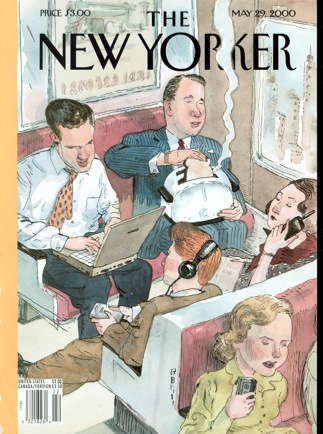After reading the great New Yorker article about Silicon Valley and politics, I searched for “Silicon Valley” on the magazine web site and found two contrasting articles:
– the first one is a kind of introduction to my previous post, it was also written by George Packer (clearly a great and insightful writer) in 2011 and is about Peter Thiel, the famous libertarian entrepreneur and investor: NO DEATH, NO TAXES – The libertarian futurism of a Silicon Valley billionaire.
– the second one is much older and is about the early days of Google and Internet search: SEARCH AND DEPLOY by Michael Specter.
They are kind of contradictory because the second one is optimistic about what technology can solve (Google greatly improved our access to knowledge) whereas Packer shows Thiel’s pessimism with the outcome of technology even if he has great hope in it. In fact as mentioned in the previous article about SV and politics, he belongs to the group of people distrusting politics to the point that he believes technology might / must be the alternative.
Let me begin with the optimistic first: in 2000, Google was already seen as the winner of the Internet search race. Even if it did not have yet its business model, Google solved better our search on the Internet. Page and Brin did it by finding a better mathematics algorithm, the PageRank system based on the popularity and frequency of reference of web pages. As a funny side result, Google had less queries than other sites on porn: “About ten per cent of Google queries are for pornography. The figure is lower than that of most other search engines. This reflects the demographics of the people who use the search engine, but perhaps it also demonstrates one of Google’s obvious failings: porn sites are sought out by millions of Internet users but are rarely linked to prominent Web pages. Without links, even the most popular page is invisible.”

The credo of Thiel’s venture-capital firm: “We wanted flying cars, instead we got 140 characters.” Photograph by Robert Maxwell.
It’s been known that Thiel has been disappointed with high-tech innovation. Just read again my 2010 post, Technology = Salvation. I think you should read Packer’s article if you liked (or even if you did not) his Change the World. Both articles show the power and limits of these visionary people and the sometimes scary vision of technology vs. politics. There is something of Kubrick’s 2001: A Space Odyssey in all this. He brilliantly shows the strange nature of these people (a high concentration of Asperger syndromes and dyslexia – apparently two rather high frequency features of entrepreneurs). Again just short notes (you have to read it to see the broadness of the topics:
“Thiel believes that education is the next bubble in the U.S. economy. He has compared university administrators to subprime-mortgage brokers, and called debt-saddled graduates the last indentured workers in the developed world, unable to free themselves even through bankruptcy. Nowhere is the blind complacency of the establishment more evident than in its bovine attitude toward academic degrees: as long as my child goes to the right schools, upward mobility will continue. A university education has become a very expensive insurance policy—proof, Thiel argues, that true innovation has stalled. In the midst of economic stagnation, education has become a status game, “purely positional and extremely decoupled” from the question of its benefit to the individual and society. It’s easy to criticize higher education for burdening students with years of debt, which can force them into careers, like law and finance, that they otherwise might not have embraced. And a university degree has become an unquestioned prerequisite in an increasingly stratified society. But Thiel goes much further: he dislikes the whole idea of using college to find an intellectual focus. Majoring in the humanities strikes him as particularly unwise, since it so often leads to the default choice of law school. The academic sciences are nearly as dubious—timid and narrow, driven by turf battles rather than by the quest for breakthroughs. Above all, a college education teaches nothing about entrepreneurship. Thiel thinks that young people—especially the most talented ones—should establish a plan for their lives early, and he favors one plan in particular: starting a technology company.”
Always consistent with his thoughts, he “came up with the idea of giving fellowships to brilliant young people who would leave college and launch their own startups. Thiel moves fast: the next day, at TechCrunch Disrupt, an annual conference in San Francisco, he announced the Thiel Fellowships: twenty two-year grants, of a hundred thousand dollars each, to people under the age of twenty. The program made news, and critics accused Thiel of corrupting youth into chasing riches while truncating their educations. He pointed out that the winners could return to school at the end of the fellowship. This was true, but also somewhat disingenuous. No small part of his goal was to poke a stick in the eye of top universities and steal away some of their best.”
I am not sure I follow him too much (I am just too normal), for example in his quest for eternity, but I understand many of his visions. He is as much a dreamer as a doer, his fund had mixed results, but he is with Elon Musk (one of his his co-founders in PayPal) among the people who push “trying” to the limits without being afraid of failing.

